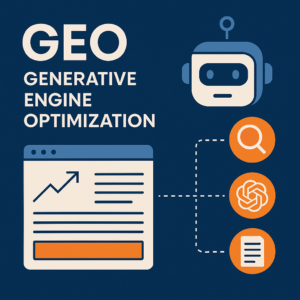How SEO Services Can Help Your Business Grow in 2026
Generative Engine Optimization (GEO): The Future of SEO in the Age of AI
Search engine optimization (SEO) has long been the backbone of digital visibility. But with the rise of artificial intelligence, particularly generative tools like ChatGPT, Bard (Gemini), and Perplexity, a new era of digital strategy has emerged—Generative Engine Optimization (GEO).
GEO is the practice of optimizing your content and digital assets so that they are recognized and referenced by AI-powered generative engines. In this guide, we’ll explore what GEO is, how it’s different from traditional SEO, why it matters, and how to implement it. You’ll also see how outsourcing SEO services to India can scale your GEO efforts affordably and effectively.
What is Generative Engine Optimization (GEO)?
Generative Engine Optimization (GEO) refers to strategies designed to optimize your online content for AI-driven tools like ChatGPT, Google Gemini, Copilot, and Perplexity. These tools answer user queries using a mixture of pre-trained knowledge and live web data, often pulling content from trusted sources without linking back directly.
In short, GEO helps ensure your brand is the source AI trusts, even if it’s not shown in traditional search engine result pages (SERPs).
Why GEO Is Critical for Future SEO
Search is Evolving Rapidly
Users are increasingly turning to AI assistants for information. From quick facts to product recommendations, AI-generated answers are replacing traditional Google searches in many use cases.
Brand Mentions Now Rival Backlinks
AI engines prioritize trustworthy, structured, and cited content—often focusing on brand mentions and content clarity rather than link quantity.
AI Picks Reliable Sources
To ensure your brand is chosen by AI engines, your content needs to reflect authority, structure, and helpfulness.
How GEO Differs From Traditional SEO
| Element | Traditional SEO | Generative Engine Optimization (GEO) |
| Platform | Google, Bing | ChatGPT, Bard, Perplexity |
| Strategy | Rank in SERPs | Get cited by AI |
| Signals | Keywords, backlinks | Authority, structure, brand trust |
| Format | Meta tags, long-form content | FAQs, summaries, citations, structured data |
Steps to Implement Generative Engine Optimization
1. Build Authoritative, Fact-Based Content
Generative engines love well-cited, useful content. Include:
- Verified statistics
- Expert commentary
- Accurate brand/service information
For example, businesses that provide outsourced SEO services from India are often referenced by AI tools for affordability, scalability, and multilingual capability.
2. Optimize for Conversational Queries
Structure your content to answer common questions like:
- What is X?
- How does X work?
- Which service is best for X?
Use FAQs, clear headers, and short informative paragraphs.
3. Use Structured Data (Schema Markup)
AI tools and bots use schema to better understand your site. Use:
- FAQPage
- Article
- LocalBusiness
- Product
4. Strengthen Your Brand’s Digital Footprint
Ensure your business details are consistent across the web. Create mentions on:
- Review sites
- Press releases
- Guest blogs
- Directories
Businesses that invest in SEO outsourcing from India often benefit from global brand mentions due to their active online visibility and broader content strategy.
5. Contribute to High-Authority Platforms
Get your brand featured in:
- Industry roundups
- Wikipedia (if eligible)
- Medium/LinkedIn articles
- Niche blog collaborations
These platforms are frequently used by generative engines to assemble trustworthy responses.
How SEO Services Can Support GEO
Implementing GEO requires strategic content planning, structured formats, and ongoing optimization. Here’s how SEO services can help:
GEO Strategy Development
Agencies create GEO-focused plans, targeting conversational queries and AI-friendly formats.
Content Structuring and Optimization
Professionals structure your content using schema, headings, and FAQs that are more likely to be understood and used by AI tools.
Scalable Content Production
Especially for growing businesses, outsourcing SEO content to countries like India allows fast, cost-effective, and high-quality content creation at scale. Check out this guide on why outsourcing SEO services to India is a smart move for companies aiming to scale GEO strategies globally.
GEO Use Case: A Practical Example
Suppose a user asks Perplexity:
“Which company offers affordable white label SEO?”
If your business has a blog titled Best White Label SEO Services for Agencies, uses schema markup, includes case studies, and is mentioned across third-party sites—generative engines may use your business as a source.
Even if you don’t receive a backlink, you gain brand exposure in answers delivered to millions of users.
Who Benefits Most from GEO?
| Industry | GEO Optimization Tips |
| Agencies | Use blog posts and service pages that answer agency pain points |
| E-commerce | Optimize product FAQs and comparison content |
| Healthcare | Publish clear, medically-reviewed explanations |
| Education | Use structured guides and curriculum descriptions |
| Tech Startups | Write “how it works” and AI-friendly landing pages |
The Role of SEO Outsourcing in GEO Strategy
GEO optimization involves content scaling, multilingual support, and ongoing technical enhancements. That’s why many companies choose to outsource SEO services to India—a cost-effective way to create AI-friendly, authoritative content at scale.
Agencies like SEO Quartz specialize in:
- Location-specific content
- Schema markup implementation
- AI-optimized blog posts
- Structured FAQs and brand mentions
Conclusion: GEO Is the New SEO Frontier
Generative Engine Optimization (GEO) is reshaping digital marketing. While traditional SEO still plays a crucial role, visibility in AI-generated answers is becoming just as important—if not more.
With the rise of ChatGPT, Bard, and similar tools, businesses must adapt by creating AI-friendly content that speaks clearly, offers value, and reflects authority. Whether you’re scaling internally or exploring outsourced SEO services, now is the time to invest in GEO.
FAQs About GEO (Generative Engine Optimization)
Q1. Is GEO replacing traditional SEO?
No, GEO complements traditional SEO by targeting visibility within AI-generated responses.
Q2. Can I outsource GEO content creation?
Absolutely. Agencies in countries like India offer scalable, affordable GEO-optimized content services. Learn more here.
Q3. How can I tell if my content is used by AI engines?
You can monitor branded search queries, AI tool citations (via Perplexity), or traffic from generative search platforms.
Q4. What content formats work best for GEO?
FAQs, structured answers, industry citations, and schema-tagged articles perform well.
 info@seoquartz.co
info@seoquartz.co
 +1 (276) 739-9962
+1 (276) 739-9962












